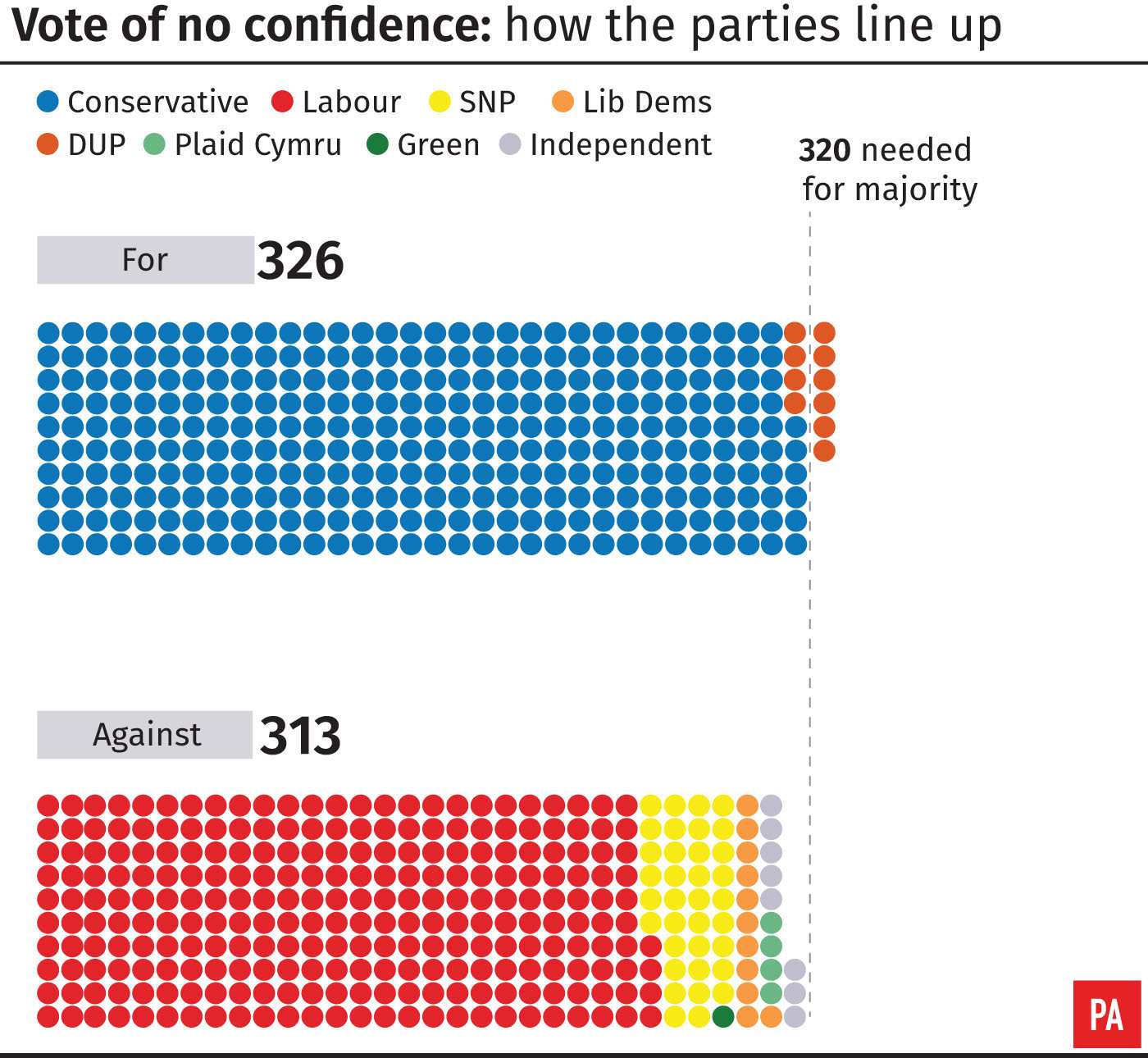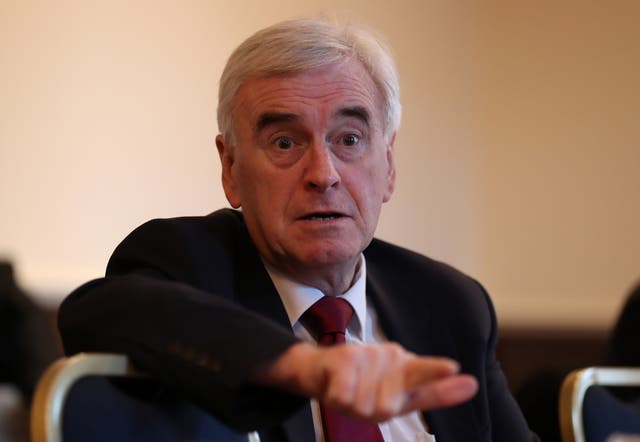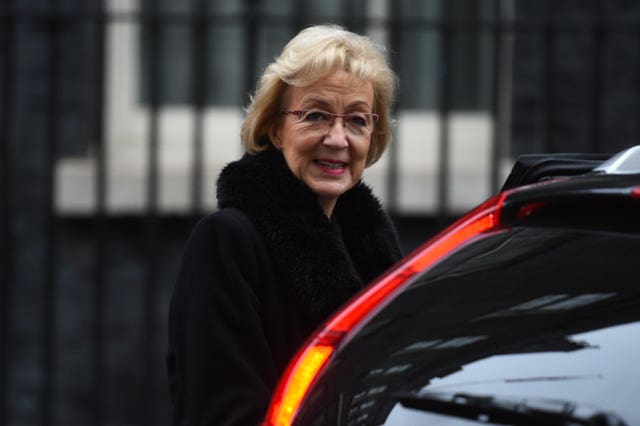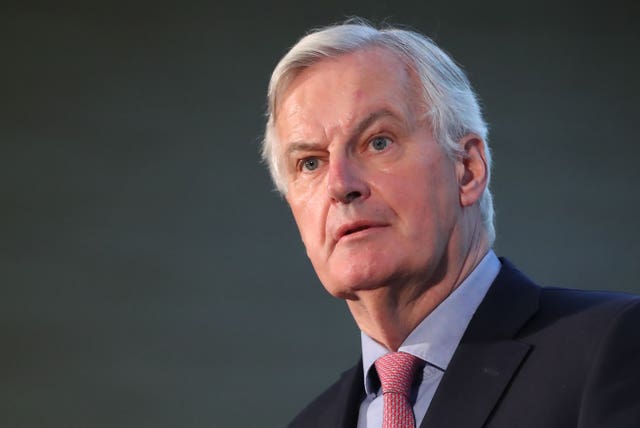May ready to reach out after crushing Brexit defeat, says Leadsom
Labour accuse the the PM of ‘negating’ moves to build a cross-party consensus before they have even started.

Senior ministers have insisted Theresa May is committed to reaching out across party lines to build a Brexit consensus following the crushing defeat of her plan for leaving the EU.
The Prime Minister faces a Commons vote of no confidence after seeing her deal with Brussels overwhelmingly rejected by MPs in the House on Tuesday.
While she is expected to survive the latest attack on her premiership, Labour warned she was in danger of scuppering efforts to find a new way forward before they had even started.

Rebel Tory MPs, who helped deliver a massive 230 majority against the Withdrawal Agreement, made clear that they would back the Government in the vote on the no-confidence motion tabled by Jeremy Corbyn, as did Mrs May’s allies in the DUP.
However MPs from both the Leave and Remain wings of the party warned that she would have to accept major changes to her Brexit plan if she was to stand any chance of winning the backing of Parliament.
Meanwhile, campaigners for a second EU referendum stepped up their efforts, with 71 Labour MPs signing a letter demanding their party commit itself “unequivocally” to a public vote if the no-confidence motion fails.
And Conservative former attorney general Dominic Grieve tabled two bills to enable the House of Commons to consider and deliver a fresh referendum.
“Holding a public vote is now essential as the only credible way out of the current crisis,” said Mr Grieve. “The public should be allowed to decide on any deal to take us out of the European Union and be given the alternative to remain if they wish.”
In the Commons at Prime Minister’s Questions, Mr Corbyn said the Government had failed the country and lost the ability to govern.

“With every other previous prime minister, faced with the scale of defeat, they would have resigned and the country would have been able to choose the government that they want,” he said.
Mrs May retorted: “The Leader of the Opposition has let anti-Semitism run riot in his party, he would abandon our allies, weaken our security and wreck our economy, and we will never let that happen.”
The Prime Minister insisted that she would not halt Brexit by revoking the two-year Article 50 process leading to withdrawal on March 29. But she appeared to leave the door open to an extension to buy more time for negotiations.
Asked by Tory grandee Ken Clarke whether she would “modify her red lines” and extend Article 50, Mrs May said: “The Government’s policy is that we are leaving the EU on March 29, but the European Union would only extend Article 50 if actually it was clear that there was a plan that was moving towards an agreed deal.
“That is the crucial element of ensuring we deliver on Brexit.”
Following the vote on Tuesday evening, the Prime Minister said she wanted to hold talks with senior parliamentarians to try to find an agreed way forward ahead of a fresh statement to the House on Monday.
However shadow chancellor John McDonnell complained that she had not invited Mr Corbyn or any of the other party leaders for talks.
After Downing Street said she remained committed to securing an “independent trade policy” – effectively ruling out a customs union which Labour supports – he warned the discussions may not even get off the ground.
“She is now laying conditions down about those discussions which look as though they will prevent any discussion of a permanent customs union,” Mr McDonnell told BBC Radio 4’s Today programme.
“That is what most of the other opposition parties support so she seems to be negating the discussions before they have even started.”
The Leader of the Commons Andrea Leadsom said Mrs May was committed to meeting with MPs who were committed to “constructively” delivering on the EU referendum vote.
However she said Mr Corbyn had failed to produce any positive proposals and was simply seeking to “disrupt” the Government by trying to force a general election at a crucial time for the country .
“I don’t think she has written him off at all but he needs to come to the table and tell us what he wants to do,” she told the Today programme.
“He has not put forward any specific constructive proposal and that is a problem, which is why the Prime Minister will be engaging right across the House with those who do have very sincerely held views but want to constructively deliver on what the vast majority of parliamentarians voted for.”

Mrs Leadsom indicated the Prime Minister was still hoping to build support for a Brexit plan which preserved key elements of the existing deal.
“What we need to do is to find a way that that deal or some part of it or an alternative that is negotiable (with the EU) can be put to the European Union so that we can get this Brexit through by March 29,” she said.
However, former minister Sir Oliver Letwin – one of the architects of plan by senior Tories to give MPs a greater say in the process – warned she would have to be more flexible.
“She put down right at the beginning of this process what she called red lines,” he told the BBC.
“This is not a terrain in which you can have things you will definitely never do. You have to sit down and talk and come up with a consensus. That means being much more flexible than we have been so far.”
Steve Baker, one of the leaders of the pro-Brexit Tory European Research Group, said Mrs May must now abandon the controversial Northern Ireland “backstop” intended to prevent the return of a hard border with the republic.
“We are not going to be able to agree to the backstop. It is obvious when you look at the vote last night. There is no getting away from it. That was an absolutely devastating blow,” he said.

The EU’s chief negotiator Michel Barnier said he “profoundly” regretted the Commons vote and that it was now up to the British Government to say how it intended to proceed.
“An orderly withdrawal will remain our absolute priority in the coming weeks,” he told the European Parliament in Strasbourg.
He said there would be a “favourable response” from the EU side if Mrs May was prepared to re-think her red lines and seek a more “ambitious” deal with Brussels, but he was adamant the backstop had to remain part of any agreement.
“The backstop which we agreed to with the UK must remain a backstop. It must remain a credible backstop,” he said.
That view was echoed by Irish foreign minister Simon Coveney who said Dublin was not prepared to consider alternatives to a backstop which it had taken two years to negotiate.
“We’re not going to allow physical border infrastructure to reappear,” he told RTE.
“I don’t think the EU is in any mood to change the Withdrawal Agreement significantly at all.”





